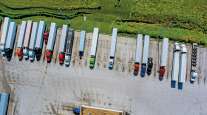Co-founder and Chief Experience Officer, Convoy
Perspective: Rethinking the Pitch for Truck Parking
[Stay on top of transportation news: Get TTNews in your inbox.]
Truck parking is a major pain point for the industry, and needs more investment from the government. It’s time to get creative about urging that investment, and potentially look to an unconventional source to find it: states’ climate budgets.
Finding truck parking is obviously frustrating for drivers and carriers. But as trucks circle areas looking for a safe place to park, they’re also emitting greenhouse gases and carbon dioxide emissions. The industry has taken great steps to ease emissions from trucking, but every little bit can help. If we as an industry can bring these concerns to the attention of the right agencies, there could be millions of additional dollars available in states’ climate budgets across the country for building new truck parking infrastructure.
The sources and amounts of this funding vary — for example, California dedicates the proceeds from its cap-and-trade program to funding initiatives that further the state’s climate goals; Washington’s Climate Commitment Act implements a similar program. In the Northeast, the states participating in the Regional Greenhouse Gas Initiative invest a portion of their proceeds into abatement projects. Other states have different approaches to funding climate initiatives — all worth looking at.

Goodale
And the trucking industry can work together on this creative approach.
For example, our company has talked to state department of transportation officials in Washington and Oregon, and we’ve learned that data is paramount.
The industry must compile empirical, hard data to demonstrate how the parking shortage is contributing to emissions output, and quantify this issue for state governments. We need to identify states whose budgets include funds for greenhouse gas reduction, and start conversations like those we’ve had in Oregon and Washington.
Once we’ve compiled the data to support our cause, companies and industry advocates that want to initiate change in their state can contact their state’s DOT and state representatives, share that data with them, and encourage them to support or even initiate efforts to increase available truck parking.
There’s also room to be innovative when it comes to the intersection of truck parking and green efforts, if states can be convinced that improved trucking infrastructure is a significant net benefit to climate initiatives.
For example, we as an industry could help create a pilot program parking lot that imagines tomorrow’s truck parking facilities. Innovative additions could include in-ground charging infrastructure for electric trucks, shore power options to reduce truck idling, and reservation and parking availability systems — all of which could be material improvements for the average trucker and could draw more partners to the cause. The success of these kinds of pilot facilities could make an even more compelling case to states to unlock climate budgets for parking.
The parking crisis and associated emissions output should be a concern for states, and we know it’s already an urgent concern for trucking companies. Making this case to state DOTs and emissions boards could be a good and fast bet for unlocking public funding to devote to building new truck parking facilities.
Grant Goodale is the co-founder and chief experience officer of Convoy, a digital freight network that moves thousands of truckloads around the country each day through an optimized, connected network of carriers.
Want more news? Listen to today's daily briefing below or go here for more info:




